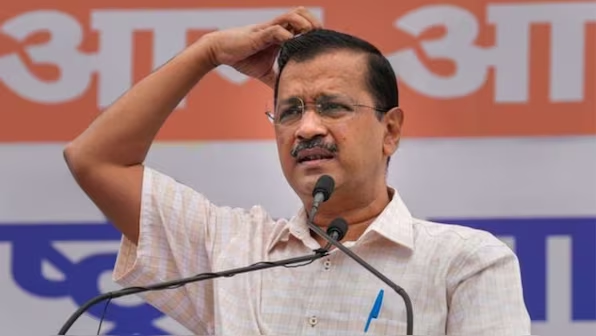New Delhi – In a significant legal development, the Delhi High Court is set to deliver its judgment today on the Enforcement Directorate’s (ED) plea to stay the bail granted to Delhi Chief Minister Arvind Kejriwal. This decision is eagerly awaited, given its potential impact on both the political and legal landscape of Delhi.

Background of the Case
Arvind Kejriwal, a key political figure and the Chief Minister of Delhi, has been embroiled in a money laundering case that has captured national attention. The case stems from allegations that Kejriwal and his associates were involved in laundering money through a network of shell companies and dubious transactions. The ED’s investigation has been ongoing for several months, and Kejriwal’s recent bail has intensified the legal battle.
ED’s Argument for Stay on Bail
The ED has moved the High Court seeking a stay on Kejriwal’s bail, arguing that his release could jeopardize the integrity of the investigation. The agency claims that Kejriwal, given his high-profile status and influence, poses a significant risk of tampering with evidence and influencing witnesses. The ED’s counsel has presented several arguments highlighting the potential risks associated with Kejriwal’s release:
- Risk of Evidence Tampering: The ED asserts that Kejriwal’s position allows him access to resources and networks that could be used to tamper with evidence crucial to the investigation.
- Influence on Witnesses: The agency fears that Kejriwal could leverage his political power to intimidate or influence witnesses, thereby hindering the course of justice.
- Interference in Investigation: The ED has expressed concerns that Kejriwal’s release could lead to active interference in the ongoing investigation, affecting its outcome.
Kejriwal’s Defense
In response, Kejriwal’s legal team has strongly refuted the ED’s claims, arguing that the allegations are politically motivated and lack substantial evidence. Key points of Kejriwal’s defense include:
- Political Vendetta: Kejriwal’s lawyers have suggested that the charges are part of a broader political vendetta aimed at tarnishing his reputation and undermining his political career.
- Cooperation with Investigation: They have emphasized Kejriwal’s cooperation with the investigation, pointing out that he has complied with all legal requirements and appeared for questioning whenever summoned.
- Lack of Concrete Evidence: The defense has highlighted the lack of concrete evidence against Kejriwal, arguing that the ED’s case is built on circumstantial evidence and conjecture.
Courtroom Drama and Legal Proceedings
The hearings leading up to today’s decision have been marked by intense legal arguments and dramatic courtroom exchanges. Senior advocates representing both sides have presented detailed submissions, making the case a closely watched legal battle.
ED’s Legal Strategy: The ED has relied heavily on documented evidence and testimonies from key witnesses to build its case. The agency has also presented forensic financial analysis to trace the flow of funds allegedly laundered by Kejriwal and his associates.
Defense’s Counterarguments: Kejriwal’s legal team has meticulously dissected the ED’s evidence, pointing out inconsistencies and gaps in the prosecution’s narrative. They have also presented affidavits and testimonies from individuals disputing the ED’s claims.
Political Ramifications
The High Court’s decision today is not just a legal milestone but also a significant political event. If the court decides to stay the bail, it could lead to substantial political turbulence in Delhi. Kejriwal’s potential re-arrest would likely trigger widespread protests from his supporters and could impact the functioning of the Delhi government.
Impact on Aam Aadmi Party (AAP): As the leader of the Aam Aadmi Party (AAP), Kejriwal’s legal troubles have already created ripples within the party. A decision against him could weaken the party’s position and affect its strategies in upcoming elections.
Opposition’s Stance: Opposition parties have been vocal about the case, with many demanding strict action against Kejriwal. A stay on his bail would bolster their stance, while a decision in his favor could be portrayed as a vindication of his position.
Public and Media Reaction
The case has garnered extensive media coverage, with news outlets closely monitoring every development. Public opinion remains divided, with Kejriwal’s supporters decrying the charges as baseless, while his critics argue for stringent legal action.
Media Analysis: Leading news channels and newspapers have featured in-depth analyses and expert opinions on the legal and political implications of the case. The High Court’s decision is expected to dominate headlines and news cycles in the coming days.
Public Sentiment: Social media platforms are abuzz with discussions and debates, reflecting the polarized views on the issue. Hashtags related to the case have been trending, indicating the high level of public engagement and interest.
Future Legal Battles
Regardless of today’s outcome, the legal saga is far from over. If the High Court stays the bail, Kejriwal’s legal team is expected to challenge the decision in the Supreme Court. Conversely, if the bail is upheld, the ED might explore other legal avenues to press its case.
Conclusion
As the Delhi High Court prepares to deliver its judgment, the anticipation is palpable. The decision will not only impact Arvind Kejriwal’s immediate future but also set the tone for the ongoing legal and political battles. All eyes are on the court, waiting to see how this high-stakes drama unfolds.




1 Comment
Pingback: Arvind Kejriwal Under CBI Investigation Ahead of Today's Critical Supreme Court Session - INPAC Times